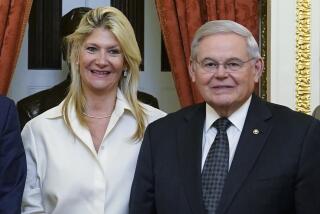Panel Seeks Keating Aide Testimony : Thrifts: The Ethics Committee requests court order to offer the former S&L; lobbyist limited immunity. His input is called vital to the probe.
WASHINGTON — In a surprise move, the Senate Ethics Committee said Wednesday that it will seek to force the former lobbyist for savings and loan owner Charles H. Keating Jr. to testify about his contacts with five senators accused of pressuring federal regulators on Keating’s behalf.
Ethics Committee Chairman Howell Heflin (D-Ala.) said that the panel will request a court order that would provide limited immunity from prosecution to James Grogan, the former Capitol Hill go-between for Keating. Unless the order is not issued, Grogan will be forced to testify.
“Mr. Grogan has no choice,” said Sen. Warren B. Rudman (R-N. H.), vice chairman of the committee.
Heflin said that committee members decided Grogan’s testimony is vital to the ongoing investigation of possible ethics violations by Sens. Alan Cranston (D-Calif.), Dennis DeConcini (D-Ariz.), John Glenn (D-Ohio), John McCain (R-Ariz.), and Donald W. Riegle Jr. (D-Mich.).
Keating, the owner of failed Lincoln Savings & Loan of Irvine, gave a total of $1.3 million to the five senators’ campaigns and to voter registration efforts tied to Cranston. He then solicited their help in his battles with regulators who were trying to crack down on Lincoln.
All five senators have argued forcefully before the Ethics Committee that they committed no ethical lapses. They have asserted that they were simply exercising their responsibilities to represent a constituent with a grievance.
“Mr. Grogan had substantial contacts with (the senators) . . . and the committee believes that it cannot fulfill its obligations to these members and to the Senate without obtaining his testimony,” Heflin said.
Despite the proposal to provide Grogan with limited immunity, his testimony is not expected to jeopardize the Justice Department’s potential prosecution of other Lincoln officials, Heflin said.
Although the committee must obtain court permission to grant immunity to Grogan, courts routinely approve such requests unless the Justice Department raises objections. Justice officials already have agreed to limited immunity for Grogan.
Under a grant of limited immunity, Grogan’s forced testimony before the Ethics Committee could not be used in any future efforts to prosecute him or to provide leads to uncover evidence against him. It would not prevent authorities from prosecuting him on the basis of information obtained by other means.
While Grogan met with all five senators on behalf of Keating, previous testimony indicates that he had the most frequent contacts with Cranston and his aides. In addition, Grogan personally delivered two checks totaling $250,000 to Cranston for his voter registration efforts.
Grogan previously refused to testify before the Ethics Committee, citing his 5th Amendment right to avoid self-incrimination.
Lawyers for Keating, who also took the 5th Amendment, told the committee several weeks ago that the former thrift owner would be willing to testify if granted immunity. But panel members said that they never seriously considered the offer because they believe that potential prosecution of the thrift executive is too important to risk doing anything that might undermine it.
So far, no federal criminal indictments have been returned in connection with Lincoln’s $2-billion insolvency, the biggest collapse among hundreds of thrift failures in recent years. Keating has been indicted in California on state fraud charges stemming from the sale of more than $200 million in now-worthless securities issued by Lincoln’s parent company. He also is the target of a $1-billion civil lawsuit filed by federal regulators.
Seven persons connected with Keating and American Continental Corp. of Phoenix, the parent company, have pleaded the 5th Amendment in refusing to testify before the Ethics Committee, including Bradley Boland, Keating’s son-in-law.
But the committee, working closely with Justice Department attorneys, decided to compel testimony only from Grogan, a former aide to Sen. Glenn.
Grogan is expected to testify initially in a closed-door session next Wednesday. He then will be questioned publicly on Wednesday or Thursday, according to the panel.
As Keating’s chief liaison in Washington, Grogan was showered with repeated orders to do the bidding for his boss and to extract favorable consideration from Congress, according to testimony in the case.
One of Keating’s targets was S&L; regulator William L. Black, who told the committee Wednesday that he had felt pressured by the senators to ease up on Lincoln.
The committee released a July, 1987, memo in which Keating wrote to Grogan: “Highest Priority--Get Black. Good grief--If you can’t get Wright and Congress to get Black--kill him dead--you ought to retire.”
“Five U.S. senators are a heck of a lot bigger than this boy,” Black told the committee, complaining that he felt intimidated during a 1987 meeting at which the senators were “pushing” to help Lincoln, which Black called “probably the worst institution in America.”
“We were put under considerable pressure immediately,” Black said of the meeting. “You could see it in everybody’s faces, we were tight as a drum.”
Black said that the meeting in DeConcini’s Senate office was “intimidating, and . . . Charles Keating had set it up to be intimidating.”
Keating enlisted the senators’ help because he wanted to sidestep a rule that would have forced Lincoln to sell dubious real estate investments at a potential loss of several hundred million dollars, said Black, who was litigation director of the Federal Home Loan Bank Board. The losses would have forced Lincoln to stop sending dividends to American Continental, which paid lavish salaries to Keating and members of his family, the regulator said.
More to Read
Get the L.A. Times Politics newsletter
Deeply reported insights into legislation, politics and policy from Sacramento, Washington and beyond. In your inbox three times per week.
You may occasionally receive promotional content from the Los Angeles Times.










